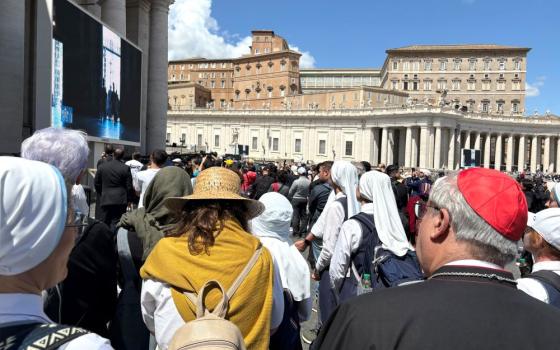President Obama is set to release a new rule that bars federal contractors from discriminating against gays and lesbians in their employment practices. The new rule lacks the kind of robust exemptions for religious organizations that many Church leaders, including prominent Obama supporters, sought. The President paired this new rule with a decision to retain a 2002 George W. Bush-era rule that allowed Church-affiliated organizations to discriminate in favor of their co-religionists in hiring. There is no easy takeaway from these twin decisions but the USCCB should think long and hard before they decide to engage in another round of legal challenges.
The first thing to note is that if President Obama were an Olympic diver, he would have just scored very high for his flawless performance of a double flip. In 2008, he pledged to overturn the Bush-era rule that permitted preferential hiring of co-religionists at religiously affiliated organizations that receive federal monies. He also, as late as 2012, was opposed to gay marriage, a position that he know deems to be so outrageous, that no exemption is warranted for those who still hold that position. Far be it from me to argue that no one is permitted to change their mind, but surely someone whose positions have just flipped so thoroughly should be a little more understanding of those unable or unwilling to perform that degree of contortionism with such rapidity.
The second thing to note is that, of the two issues, the rule permitting preferential hiring of co-religionists is by far the more important. You can’t have a Catholic school – or a Methodist school, or a Jewish school – without Catholics, Methodists and Jews. The “Catholic identity” of our institutions cannot be maintained without a critical mass of Catholics. If the administration had decided to overturn that rule, all of our Catholic institutions would run the risk of going the way of Harvard and many other schools, which started as religious institutions, and have large chapels in the center of their campuses to prove it, but which now have no religious identity to speak of. If the administration had given the Church a binary choice – choose the Bush-era rule or choose robust exemptions from the LGBT non-discrimination rule – I would have chosen what we got in a heartbeat.
The third thing to note is that ever since the controversy over the HHS contraception mandate began, many have been urging the USCCB’s ad hoc committee on religious liberty to focus their argument more on the institutional integrity of our Catholic institutions, and not so much on the argument from conscience rights. This advice has been largely ignored and, consequently, the USCCB is spectacularly ill-prepared for any fight on a non-discrimination rule. Certainly, the Supreme Court’s ruling in the recent Hobby Lobby case offers no solace: The court ruled that the mandate, as applied to closely held corporations, failed to abide by the requirement of the Religious Freedom Restoration Act (RFRA) that the government prove that it has a compelling state interest in burdening anyone’s religious beliefs and that the government adopt the least burdensome means of achieving that interest. The key holding in Hobby Lobby was that the government did not adopt the least burdensome means, and pointed to the accommodations offered to non-profits as a less burdensome means. But, I can’t imagine how you can come up with a more or less burdensome means when the issue is non-discrimination. Had the conference made the argument against the contraception mandate on the basis of the integrity of our institutions, the Church would have a leg to stand on now, and not just a leg, but a stance that is more consistent with Catholic thought.
There is a related danger, one that the lawyers for the bishops, and our friends at the Becket Fund, are unlikely to point out to the bishops. RFRA passed with overwhelming majorities of both chambers of Congress and was signed into law by President Bill Clinton. Could it pass today? Would it be signed by a Democratic President? More worrisome, is it not possible that a future Congress, in Democratic hands, might seek to rescind RFRA? Lawyers, understandably, think about litigation is the way to vindicate a claim. This is troubling, or should be troubling for our bishops, who do not need to be known in the culture as those guys who are forever suing the government. But, just as importantly, whatever legal strategy is adopted cannot be at odds with a political calculation. In the case at hand, the USCCB declined to support the Employment Non-Discrimination Act, which had some religious exemptions. Now, this new order has no religious exemptions. Let’s be clear: If the bishops continue a litigation-first strategy, and if they fail to grasp the sea change in public attitudes towards gays and lesbians, they will be cast in the role of bigots. That is precisely the moment when a political groundswell to overturn RFRA could catch on. The lawyers may not have told the bishops that they are playing with fire, but they are playing with fire.
There is another question, and it has to do with theology: Does the USCCB need to fight this new LGBT non-discrimination rule in the first place? I know we will hear some slippery slope arguments from the legal counsel although, as I have pointed out previously, slippery slope arguments work both ways on discrimination issues: Minorities rightly fear that any attempt to segregate them from the general population can lead to very ugly ostracizing and worse. There are precedents for both sets of slippery slope arguments, so let us have at the merits.
The Church has drawn a clear distinction between homosexual persons and homosexual acts or inclinations. Many have argued that this distinction is meaningless. To be clear, the Church’s use of the term “intrinsically disordered” was unfortunate all around. But, that term was never applied to gay people, only to the same-sex inclination. The language is drawn from the Council of Trent’s teaching on concupiscence. I admit that, as a pastoral matter, the judgment of the act or inclination will also fall on the person in an area of human life like sexuality that is so closely intertwined with a person’s identity. But, nonetheless, the Church has insisted that the distinction be made theoretically at least.
Does not that distinction bear on the issue at hand? After all, a religiously affiliated organization does not hire an inclination or an act, it hires a person. And the Church has affirmed, repeatedly, that the homosexual person is to be loved and is not to be unjustly discriminated against. On what basis, then, should we decline to abide by a government regulation that we not discriminate against gay people in hiring? This is not just about legal or political strategy, but about being true to what the Church actually teaches, not just joining whatever culture war battle happens to be going on at the moment.
The concern, after all, is that our Catholic schools or hospital or charities be able to act in ways that are consistent with what the Church teaches, and that no employee, for any reason, be a kind of counter-witness to the Church’s witness. It goes without saying that there are at this moment, plenty of gay men and women working in various ministries of the Catholic Church. It is only a problem if the issue of counter-witness arises, an issue that this new rule from the Obama administration does not address. Of course, if a gay activist is hired as a teacher in a Catholic school, and uses the lectern to denounce the Church’s teachings on sexual matters, that person should be fired for bringing their personal opinions into the classroom in an inappropriate manner. Nor do I suspect a gay teacher could successfully claim that being forced to teach what the Church teaches about homosexuality constitutes a hostile work environment, although I also suspect such a case would at least get to the courts. A fair-minded judge would rightly look suspiciously at a decision to refuse to hire a gay person per se, but that same judge might understand that a gay teacher who undermined the Church’s teaching in any overt way deserves to be let go. After all, I would not expect a gay rights organization to hire a born again Christian as part of their communications’ team if she was unwilling to advocate for the positions of the organization, even when they are at odds with her own beliefs.
If the Church continues to resist every government regulation with a lawsuit, it will paint itself into a corner politically and culturally. Bishops as litigants is just not the image of an apostle set before us in the Scriptures. And, the USCCB should not consider itself an arm of the Becket Fund. They are flying pretty high over at the Becket Fund after the Hobby Lobby decision, but I fear, and fear greatly that the Church can lose in the long-term by winning in the short-term, turning the slippery slope argument on its head. The Becket Fund lawyers are very smart, but they are part of a conservative echo chamber that often misjudges the political landscape. And, as I have pointed out before, there are real limits to the degree to which the Church can embrace the Becket Fund’s foundational argument that people have the right to be wrong. That is not the basis for religious freedom set forth in Dignitatis Humanae.
If, on the other hand, the leaders of our Church say, “Hey, we think we can make this work,” and we try to do so, and a subsequent thorny, but particular conflict arises, such as the two instances cited above, I do not know what the courts would rule, but I do know the ambient culture would be more inclined to hear what we have to say and much less inclined to dismiss us as bigoted detritus from the past. I have written before that the anti-gay animus of some Catholics just makes no sense, it is as if you know this one discrete fact about a person, then “we’re not hiring him” and “I’m not going to bake her a cake,” and “they can’t stay at my hotel.” The fact that an immigrant support group, this time in Portland, Oregon, can no longer get grants from the Catholic Campaign for Human Development because it is associated with a group that supports gay rights, begs the question: Why is this a counter-witness? Is this “cooperation with evil”? And, why is it always the LGBT issue that catches the most attention from the culture warriors?
The all-litigation, all-the-time strategy only makes sense if you also buy into the larger, deeper narrative about the situation of the Church in contemporary culture. Too many bishops are still crouched in a defensive posture, too willing to let the faith be reduced to ethics (and that, only sexual ethics), then reduced to a legal strategy, convinced that the forces of secularization are hostile, organized and winning. This worldview, I would submit, is not the approach that has permitted Pope Francis to capture the imagination of the world. Yes, the ambient culture is bewildering, but there is nothing in the Church’s teaching that demands gay people be systematically discriminated against in hiring at our Catholic institutions. This is a fight we should decline. Take the win on the rule permitting preferential hiring of co-religionists. And, get back to spreading the joy of the Gospel. One of the ways to end the “culture warrior” mentality at the USCCB is to look for solutions not new battlefields.



